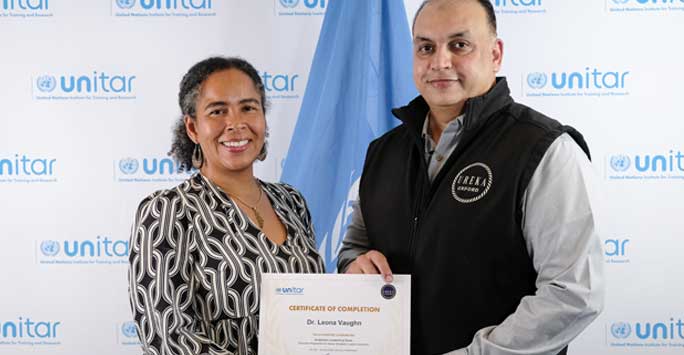
Dr Leona Vaughn, Derby Fellow and Senior Lecturer (Slavery and Unfree Labour Research), describes her experience of being part of the first cohort selected for the Academic Leadership Suite programme with UNITAR (UN Institute for Training & Research) and UREKA in Geneva.
Leona writes:
In July 2025 I was part of the first cohort for the United Nations Institute for Training and Research Academic Leadership Suite delivered in partnership with UREKA.
I arrived in Geneva unsure of what to expect. I was one of 29 colleagues exploring our leadership skills and the challenges within our sector. The following 2 days were filled with stimulating discussion and content, not only from and with programme facilitators, but Higher Education colleagues from around the world.
Considering the global future of HE with a significant representation of colleagues from 12 countries in Asia and South West Asia/North Africa, brought a wonderful vitality to conversations we often have in geographical silos.
Shared questions were surfaced in conversations about our sector relevance to a rapidly changing society; how we can get ahead of the curve on Artificial Intelligence (AI); how HE needs to adapt to become sustainable; and how we give students the best experience and equip them with the right skills to make future positive change in their chosen sectors.
Deep discussions occurred throughout an incredibly packed couple of days, about the contribution of HE across all of our work to supporting achievement of the 2030 UN sustainable development goals (SDGs) and forecasting what we felt would be likely to happen post-2030.
We discussed how HE is a much-needed actor in the 2030 agenda for peace and prosperity for people and the planet, especially in relation to reducing inequalities and upholding rights to education and health at this current time of genocides, war and social division.
We considered how HE to date has upheld in particular Principle 2 of the SDGs to 'Leave No-One Behind’, and what that relationship has looked like Global North to Global South, especially in terms of inequity, exploitation and extraction, versus emerging and growing ‘South/South’ collaborations of mutual assistance and respect.
The Academic Leadership programme stated aims are to equip upcoming HE leaders with the skills to shape the future of the sector globally and consider how this work aligns with UN SDGs. I feel it did more than this. It created a vibrant international network of educators that will undoubtedly stay connected over the coming years to develop, innovate and collaborate with the explicit intention of creating social good.
Learn more about Leona and her work on her staff page.